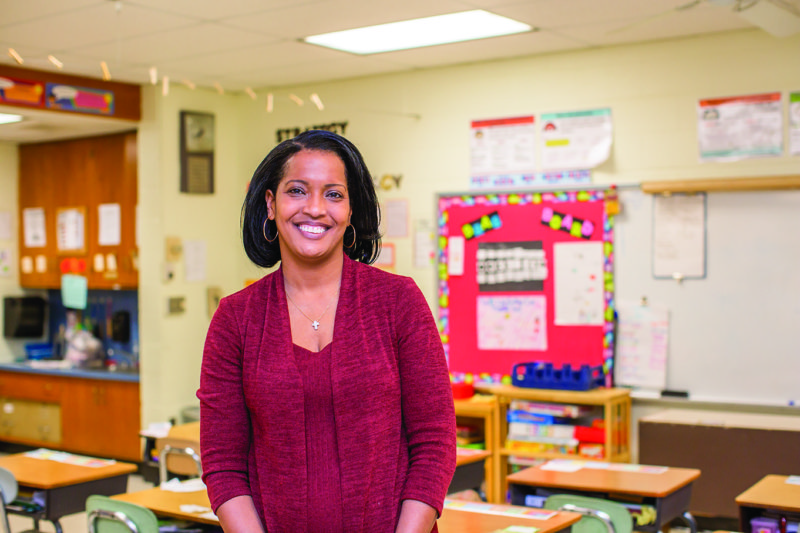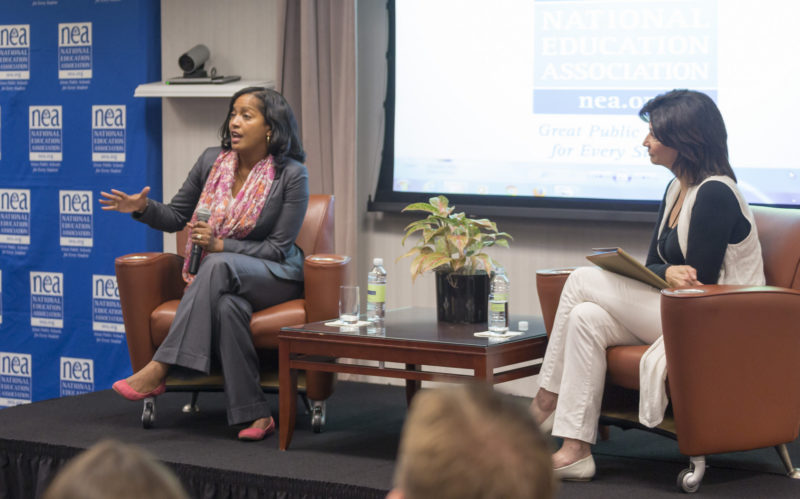 UPDATE: She was the 2016 National Teacher of the Year and now she is the newest member of Congress! Congratulations Jahana Hayes!
UPDATE: She was the 2016 National Teacher of the Year and now she is the newest member of Congress! Congratulations Jahana Hayes!
Jahana Hayes, history teacher at John F. Kennedy High School in Waterbury, Connecticut, and the 2016 National Teacher of the Year, has lived the struggles that face her students. She grew up surrounded by poverty, drugs and violence, and became a teenage mother in high school. But her teachers didn’t give up on her. They helped her realize she was not only college material, but had many gifts to contribute to the world. Those educators inspired her to become the first in her family to attend college and go on to become a teacher.
NEA President Lily Eskelsen García recently invited Hayes to the NEA headquarters in Washington, D.C. for a candid conversation about her role as National Teacher of the Year and what she has observed and learned about public education today.
Hayes spoke candidly about many of the issues facing teachers today. Here are some of the highlights.
On Having a National Forum
JH: Someone said when your values are clear your decisions will be easy, and I know that I am a teacher and I care about students. The role of National Teacher of the Year has given me a platform to talk about my students. No matter who it is I’m talking to, I am always bringing their stories to the forefront. And I say that no matter where they come from or what their economic situation is, there is no reason to feel sorry for them. They are amazing young people who will change the world. But the point is, this role is not about me. I have all these kids who are counting on me so I am compelled to share their stories.
I’ve spoken to students, teachers, community leaders, administrators, superintendents, policy makers – and what I’ve found so empowering is that there are so many people in so many different roles who have the exact same passion and want the same things. Our challenge is that we haven’t had enough of these conversations with each other, but we all want what’s best for students.
On the Shortage of Minority Teachers
JH: I always knew I wanted to be a teacher but wasn’t sure if I fit into this profession. I thought all of my teachers had parents who were teachers, who helped them get into colleges of education. I didn’t know how to begin, so I spent a lot of time working other jobs before I found my way back to teaching.
It can be so lonely and you can feel so unsupported that you decide to leave the profession. New teachers need someone to hold their hand. I had so many people who have held my hand and now I’m just paying it back."
My students also have this unrealistic idea of what it takes to be a teacher. I’ll have conversations with students about their future, and many will say they want a job where they can help others and give back to their communities, but they don’t associate that with teaching. They really don’t understand how to get there. Our job is to help them understand.
When I started in my building, there were 126 certified professional staff, three of whom were minorities. There were things I’d never heard of or didn’t know how to do, but I was almost embarrassed to ask my colleagues. All new teachers, particular minority teachers, need that kind of support, and that shared identity.
It can be so lonely and you can feel so unsupported that you decide to leave the profession. New teachers need someone to hold their hand. I had so many people who have held my hand and now I’m just paying it back.
On Talking to Students About Social Injustice
JH: When a social injustice grabs the headlines, I’d tell educators to first pause and reflect. If you don’t have anything to say, don’t say anything. But it’s important to create an environment where kids feel comfortable enough to have these conversations. Creating that space is ongoing and is embedded in everything we do in class.
We’ve had a huge influx of Albanian Americans in cour school community, and I knew very little about this community. I asked questions all the time in my class and gave students an opportunity to say, today is an Albanian holiday and this is what it means. If other students had questions about their background or anyone else’s, we had a safe space where kids could ask questions without worrying if it was stereotypical or demeaning or devaluing. It’s never easy, but you can create a place where students are comfortable sharing nice and not-so-nice things they’re hearing and figuring out where they fit into all of that.
 Jahana Hayes (left) and NEA President Lily Eskelsen García.
Jahana Hayes (left) and NEA President Lily Eskelsen García.
On Engaging the Community
JH: So much more can be done to teach new educators how to engage with their communities, to talk to parents, and deal with all the people they come into contact with in their profession.
Teaching is not just about preparing lessons and meeting a standard or being accountable. There are so many intangibles new educators need to master. How do you communicate with parents who aren’t coming to the open house or parent meetings? How do you do a survey of the community to find who your partners are, who your friends are, and what the organizations are available to help?
Teachers need to know the dynamics of the community. They need to understand the value of what happens outside of the classroom. In my community, I visited all of the churches and talked to all of the pastors as I was trying to engage minorities. If I’m trying to people who haven’t been part of the conversation and I know they hang out at church, then I’m going to church to see them.
I don’t want any of my students' parents to be embarrassed about their level of education. I tell them that whatever their gift is, I need it in my classroom. Let’s work together to educate our children.
On Unconcious Bias
JH: I hear comments from my colleagues that indicate that parents who are not as involved are not as caring about education. But my grandmother never went to my school because she didn’t drive -- that didn’t mean that she didn’t care and wasn’t helping me with my education at home.
Until we make that investment and decide that it’s important enough to give teachers the resources they need, to pay teachers the salaries they deserve because they are professionals, until that happens, we’re not going to attract the best teachers."
I once got a note from my son’s teacher that he was being defiant and disrespectful. She’d asked the class to come to the board to write answers to math problems, and my son was jumping out of his seat and shouting them out, even after she’d told him not to. He told me he was just so happy because they were match concepts he’d struggled with for so long and he finally got it. I told his teacher, I am raising a young black boy, and the words defiant and disrespectful may mean something very different than the behavior you describe. As educators we have to be very careful about the words we use. We must be purposeful in our actions and words.
On Ending the Teacher Shortage By Valuing Educators
JH: As the Teacher of the Year, I feel valued and respected as a professional. But until we make that investment and decide that it’s important enough to give teachers the resources they need, to pay teachers the salaries they deserve because they are professionals, until that happens, we’re not going to attract the best teachers. I have students who would be great amazing educators but are very nervous that if they go into the profession they’ll never be able to pay off their student loans because the low pay teachers receive.
I hear from people who are committed to pushing education legislation but have never had a real conversation with a teacher. We must open up a space where teachers have an opportunity to say what the legislation would look like in their classrooms.
I say to lawmakers, 'I don’t want to write policy. I just want you to know how your job impacts mine. I trust that you’re a tremendous elected official, so please, trust me.'







